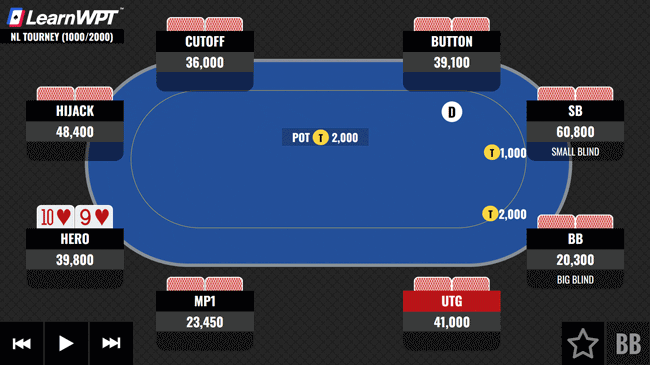Poker Quiz! T♥9♥ in an Online Tournament, What Do You Do?
DECISION POINT: In an online tournament you’ve just been moved to a new table and have no reads on your opponents. The blinds are 1,000/2,000 with a 2,000 big blind ante. It folds to you in Middle Position and you raise first-in to 5,500 with T♥9♥. The player to your immediate left calls and everyone else folds. The flop comes K♦9♣4♣ and action is on you.
What do you do here?
PRO ANSWER: We are playing a mid stakes online tournament after just being moved to this table and have no significant reads. The blinds are 1,000/2,000 with a 2,000 big blind ante. There are eight players at the table and we are dealt Th9h in MP2. Everyone folds to us and since T9s is in our opening hand range we make it 5,500. The player to our immediate left calls and everyone else folds.
The flop is Kd9c4c. When deciding if we should continuation bet, one of the first things to consider is who has the range advantage. Since our opponent in the Hijack flat called with four players left to act, it’s likely they have a somewhat narrow and condensed range. This means that while we likely have more AK/AA/KK combos, our opponent still has a lot of KQ/KJs/KTs hands as well as a fair amount of flush and straight draws that might float.
If we consult a solver assuming appropriate ranges for both players, the Hijack has a 50.3% to 49.7% equity edge while we have strong flop hands like top pair with top kicker or better around 8% more of the time than they do. It’s important to note that even the most skilled players can’t be expected to replicate a solver in real-time.
Continued below...
However, we can see that this is a flop that likely hits both ranges in a way where no player has a significant edge. While our hand does benefit some from equity denial given we are out of position, none of the hands that have significant equity against us are likely to fold unless we decide to overbet all-in and turn our hand into a bluff.
Against good, competent players we mostly want to be checking here in an attempt to keep the pot under control and realize our equity.
Consulting a solver confirms this as our hand checks around 80% of the time, and the other 20% of the time makes a very small bet of around 25-30% of the pot. We could exploitatively adjust this line based on specific player reads, however being new to the table we want to play fundamentally sound poker.
Checking is the best play.
How would you play it?
Share your answer in the comments below!
“Did I play that hand right?”
It’s that fundamental question that, as poker players, we all ask ourselves on a regular basis…
Get clear answers to all of your questions with the popular LearnWPT Ask a Pro Feature!
- Members can ask poker questions to get in-depth answers from our LearnWPT Pros
- Discuss poker strategy with our Pros and LearnWPT Members
- Submit YOUR poker hands to get expert analysis and feedback by real poker coaches!
Find out what’s it like to have a professional poker coach help you improve your game by trying out your first month of Membership at LearnWPT for just $5.
Have Questions? Email our support team at [email protected].


